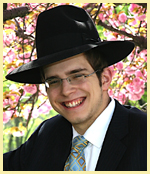Positive Criticism & Self-Esteem
Parshas Acharei Mos:
The Medrash says that when Iyov heard that the two sons of Aharon died he became very worried. Why?
Chazal explain that Iyov was afflicted with suffering, because when he was an advisor to Pharoh, Iyov did not protest to Pharoh’s [following Bilaam’s advice] decision to throw the Jewish babies into the river.
Chazal also say that when Moshe & Aharon were walking, followed by Nadav and Aveehoo, Nadav turned to Aveehoo & asked ‘when will these two elders [Moshe & Aharon] die, and we will finally be able to take over as leaders of Klal Yisroel?’ For this statement, they were punished.
Of course there is a deep understanding for why Nadav said what he said and it wasn’t a petty lust for power, but either way, why was AVEEHOO punished? He didn’t say anything, he just kept quiet!?
We see from here that when something wrong is going on, being quiet isn’t good enough, you must protest. Since Aveehoo didn’t protest, he was killed.
So when Iyov heard that the two sons of Aharon died [not just Nadav but Aveehoo also], he realized this concept; silence is admission, and remaining quiet does not suffice. Therefore, he feared that he, too, would be punished because he also had just been quiet and hadn’t protested. And that is what came to be….
I am not citing this Dvar Torah to say that we should jump at every opportunity to protest, and attend every rally under the sun! We should all follow our Daas Torah when to attend rallies & protests and when not to. But, if we are in a situation where we know protesting a friend or colleague’s improper actions will be under the guidelines set by the Torah for when one should protest or give rebuke, let us gather the strength not to be quiet [and certainly not to laugh or encourage] but to speak out firmly for the sake of the glory of Hashem.
Parshas Kedoshim:
The Pasuk in this week’s Parsha tells us, when one rebukes his fellow Jew ‘ולא תשא עליו חטא’. The simple explanation is that you should be careful to give rebuke in a way where you will not sin, like by embarrassing him.
The Chavas Ya’eer & other commentators explain in a homiletic twist that ולא תשא עליו’ חטא’ means, don’t raise the sin over him. Don’t say ‘how could you do such a terrible thing, you are such a wicked person’. Rather, lift him up over the sin. Say ‘you are such a special person it’s not befitting for someone like you to do something like that’.
Perhaps we can take this theme one step further. Not only in regards to rebuking others do we have to be very careful to refrain from derogatory comments & only give positive reinforcement, but also in how we view ourselves. If a person views himself as a bad person who has sinned in the past, then when more tests come his way, the person might say ‘I’m such a bad person already so what difference does it make if I sin more’. Or, ‘I’m a not a holy person so my learning, davening, & Mitzvos aren’t valuable’.
That is a terrible mistake!
The right outlook is to say ‘I am a sincere good person, yes, I am not perfect, and yes, I may have my shortcomings, but I am seeking to grow and change for the better’. With that outlook, when one is tested with challenges one will be able to say ‘no I am not going to give in to the Yetzer Hara, the act that he wants me to do is not befitting someone of my caliber’!
Let us all take this lesson from the Parsha to heart. To always give positive, constructive criticism and for ourselves to always have a healthy self esteem. This will Iy”H help us overcome a lot of the tests & challenges that the Yetzer Hara sends our way.



